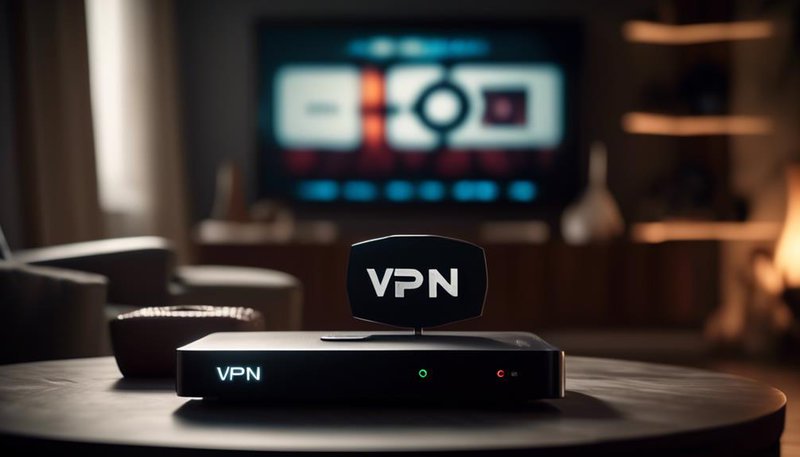How to Extend VPN Protection to Your Smart TV

To extend VPN protection to your smart TV, follow these steps to ensure a secure streaming experience:
- Set up a VPN on your router.
- Connect your smart TV to the VPN-enabled router.
This will encrypt your internet traffic and protect your privacy while streaming.
Key Takeaways
- Using a VPN for your Smart TV enhances online privacy and security by encrypting your internet connection and hiding your IP address.
- A VPN also provides protection from hackers and surveillance agencies, ensuring that your personal information remains secure.
- With a VPN, you can bypass geographical restrictions and access content that may be blocked in your region.
- When choosing a VPN provider, consider factors such as security features, server network, logging policy, customer support, reputation, and reliability.
Why Use a VPN for Your Smart TV?
Why should you use a VPN for your Smart TV?
Well, there are several benefits to using a VPN on your Smart TV that you don't want to miss out on.
First and foremost, a VPN provides you with enhanced online privacy and security. By encrypting your internet connection and hiding your IP address, a VPN ensures that your online activities remain private and protected from prying eyes.
Another advantage of using a VPN on your Smart TV is the ability to bypass geographical restrictions. With a VPN, you can access content that's otherwise unavailable in your region. This means you can stream your favorite shows, movies, and sports events from anywhere in the world, giving you the freedom to enjoy a wide range of entertainment options.
On the other hand, not using a VPN on your Smart TV comes with its drawbacks. Without a VPN, your online activities are exposed to potential threats, such as hackers and surveillance agencies. Additionally, you may encounter geo-blocking restrictions that prevent you from accessing certain content.
Choosing the Right VPN Provider
To ensure optimal protection for your Smart TV, it's crucial to carefully select a reputable VPN provider. With the increasing number of providers available, it can be overwhelming to choose the best one for your needs. To help you make an informed decision, consider the following factors:
- Security Features: Look for a VPN provider that offers robust security features such as encryption protocols, DNS leak protection, and a kill switch. These features ensure that your data remains secure and your online activities are protected from prying eyes.
- Server Network: A wide server network allows you to access content from different regions and ensures a fast and stable connection. Choose a VPN provider with a large number of servers across various locations for the best streaming experience.
- Logging Policy: Opt for a VPN provider that has a strict no-logs policy. This means that they don't collect or store any information about your online activities, ensuring your privacy and anonymity.
- Customer Support: Choose a VPN provider that offers reliable customer support, preferably with 24/7 availability. This ensures that you can reach out for assistance whenever you encounter any issues or have questions.
Setting Up a VPN on Your Smart TV
To set up a VPN on your Smart TV, you'll need to follow a few simple steps.
First, check if your Smart TV model supports VPN functionality. Some newer models have built-in VPN support, while others require additional hardware or software.
Next, choose a VPN protocol that's compatible with your Smart TV. Common VPN protocols include OpenVPN, IKEv2, and PPTP.
Once you have selected a protocol, sign up for a VPN service that offers support for your chosen protocol.
Install the VPN app on your Smart TV, either by downloading it from the app store or by sideloading it using a USB drive.
Launch the VPN app and enter your login credentials.
Select a server location from the available options, preferably one that's geographically close to your location for optimal performance.
Finally, connect to the VPN server and enjoy a secure and private browsing experience on your Smart TV.
Configuring the VPN on Your Router
Now let's move on to configuring the VPN on your router for seamless VPN protection on all devices in your network. Securing multiple devices through your router is an effective way to ensure that all your internet traffic is encrypted and protected. Follow these steps to configure the VPN on your router:
- Choose a VPN-compatible router: Not all routers support VPN configurations, so it's important to select one that does. Look for routers that have built-in VPN client support or are compatible with VPN firmware.
- Determine VPN encryption protocols: Different VPN providers offer various encryption protocols, such as OpenVPN, IKEv2, or WireGuard. Check your VPN provider's website or documentation to find the recommended protocol and settings for your router.
- Access your router's administration panel: Open a web browser and enter your router's IP address. Log in with your username and password to access the settings.
- Configure the VPN on your router: Locate the VPN settings in your router's administration panel. Enter the VPN server address, username, and password provided by your VPN provider. Select the appropriate encryption protocol and save the settings.
Troubleshooting VPN Connection Issues
If you're experiencing difficulties with your VPN connection, there are several troubleshooting steps you can take to resolve the issue.
Common VPN connection issues can include slow internet speeds, connection drops, or the inability to connect to the VPN server.
First, check your internet connection and ensure that it's stable and working properly. A weak or unstable internet connection can cause VPN issues.
Next, try connecting to a different VPN server. Sometimes, specific VPN servers may be experiencing high traffic or technical issues. By switching to a different server, you can potentially resolve the problem.
Additionally, make sure that your VPN software is up to date. Outdated software can lead to compatibility issues and may cause the VPN connection to fail.
Lastly, check your firewall settings and make sure that they aren't blocking the VPN connection. Firewalls can sometimes interfere with VPN connections, so adjusting the settings may help resolve the issue.
Optimizing VPN Performance for Streaming
To optimize VPN performance for streaming on your smart TV, there are two key points to consider.
First, you need a VPN that offers fast speeds to ensure smooth streaming without buffering or lag.
Secondly, make sure the VPN is compatible with the apps and streaming platforms you use, so you can access all your favorite content hassle-free.
Speed for Streaming
Maximize your streaming speed by optimizing VPN performance for a seamless viewing experience on your smart TV. To ensure smooth streaming without buffering issues, follow these tips:
- Choose a VPN server close to your location: By connecting to a server that's geographically closer to you, you can reduce the distance your data needs to travel, resulting in faster speeds.
- Use a wired connection: While Wi-Fi is convenient, a wired Ethernet connection can provide a more stable and faster internet connection for streaming.
- Select a VPN protocol with less encryption: While encryption is important for security, using a less secure protocol like PPTP or L2TP/IPsec can improve VPN speed for streaming.
- Disconnect unnecessary devices: If you have multiple devices connected to the VPN, disconnect the ones not in use to free up bandwidth and improve streaming speed.
Compatibility With Apps
For optimal VPN performance when streaming, ensure compatibility with your apps.
It's important to regularly check for app updates on your smart TV to ensure smooth and uninterrupted streaming. App updates often include bug fixes and performance improvements that can enhance your streaming experience.
By keeping your apps up to date, you can ensure that they're compatible with the latest VPN protocols and encryption standards, maximizing both your security and streaming quality.
Additionally, make sure that the VPN service you choose supports the apps you frequently use for streaming. Some VPN providers offer dedicated apps specifically designed for popular streaming platforms, providing a seamless and hassle-free experience.
Additional Tips for Securing Your Smart TV With a VPN
To secure your Smart TV with a VPN, you have two compatibility options.
Using a VPN app directly on your TV:
- If your Smart TV has a built-in VPN app, you can download and install it to encrypt your internet traffic.
Configuring your router to connect to a VPN:
- Alternatively, you can configure your router to connect to a VPN. This will secure all devices connected to your network, including your Smart TV.
VPN Compatibility Options
Consider exploring the various VPN compatibility options available to secure your Smart TV effectively.
Here are four options to help you extend VPN protection to your Smart TV:
- Router-level VPN setup: Set up a VPN connection directly on your router to secure all devices connected to your network, including your Smart TV.
- Smart DNS: Use Smart DNS services that allow you to bypass geo-restrictions without encrypting your traffic, providing faster streaming speeds.
- Virtual Router: Turn your laptop or desktop into a virtual router and connect your Smart TV to it. Then, connect your virtual router to a VPN to secure your Smart TV.
- VPN-enabled router: Purchase a VPN-enabled router that comes pre-configured with VPN software, allowing you to easily connect your Smart TV to the VPN.
Router Configuration Requirements
To ensure a secure connection for your Smart TV, it's crucial to navigate the router configuration requirements for setting up a VPN.
The first step is to check if your router is compatible with VPNs. Not all routers have the capability to support VPN connections, so it's essential to verify compatibility before proceeding. If your router isn't compatible, you may need to consider purchasing a new one that supports VPN functionality.
Once you have a compatible router, you'll need to access its settings and configure the VPN connection. This typically involves entering the VPN server address, username, and password provided by your VPN service. Additionally, you may need to adjust network settings to allow for the VPN connection.
Frequently Asked Questions
Can I Use a Free VPN Service for My Smart Tv?
You can use a free VPN service for your Smart TV, but it's important to consider its compatibility with your device. Ensure that the VPN you choose supports Smart TV platforms for optimal protection.
Will Using a VPN Slow Down My Internet Connection on My Smart Tv?
Using a VPN may slow down your internet connection on a smart TV, but you can choose a VPN provider with fast servers and optimize the connection by connecting to servers closer to your location.
Can I Access Geo-Restricted Content on My Smart TV With a Vpn?
Unlock a world of restricted content on your smart TV by accessing geo-blocked content with a VPN. Experience the benefits of enhanced security, privacy, and freedom, all in the comfort of your living room.
Is It Possible to Connect Multiple Smart TVs to the Same Vpn?
Yes, you can connect multiple smart TVs to the same VPN. This offers the benefits of securing your internet connection, accessing geo-restricted content, and protecting your privacy on all of your devices.
Are There Any Security Risks Associated With Using a VPN on My Smart Tv?
Using a VPN on your smart TV can provide enhanced security and privacy. By encrypting your internet connection, it safeguards your personal information and protects against potential security risks.









